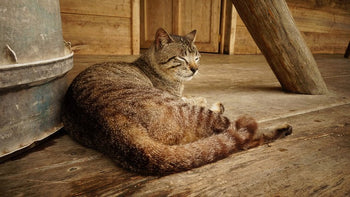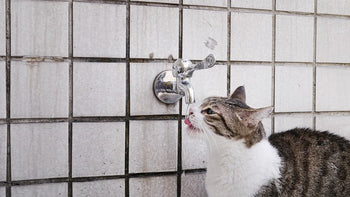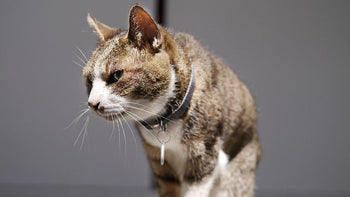If you’ve ever wondered, "Why does my cat meow so much?" you’re not alone. Cats use meowing as their primary way of communicating with humans, and while some cats are naturally more vocal than others, excessive meowing can be frustrating. Whether your cat wakes you up at 5 a.m. or keeps howling for food, understanding why they meow is the first step toward managing their behavior. In this article, we'll explore common reasons for excessive meowing, what you can do about it, and what actions to avoid.

Why Does My Cat Meow So Much?
Hunger or Thirst
One of the most common reasons cats meow is to ask for food or water. If your cat wakes up meowing every morning, it might be because they are hungry. Cats are creatures of habit, and they often associate certain times of day with meals, which could explain why your cat meows at 5 a.m. every morning.
Attention and Affection
Cats meow to get your attention, whether they want to be petted, let into a room, or simply because they enjoy interacting with you. If your cat meows when you leave the room, it’s likely a form of separation anxiety or a desire for company.
Morning Routine
Many cat owners report their cat meows in the morning or wakes up meowing. This is common, as cats are often more active at dawn. You might be wondering, why does my cat wake me up every morning? Cats have a natural instinct to hunt at dawn, and they may wake you up as part of their internal clock, expecting food or playtime.
Loneliness or Boredom
If your cat keeps meowing in the morning, it might be trying to tell you it’s bored or lonely. Cats need mental stimulation and social interaction. When these needs aren't met, they may vocalize more.
Health Issues
A sudden increase in meowing could indicate health problems. Cats that are in pain, suffering from cognitive decline, or have hyperthyroidism may meow excessively. If your cat meows after eating or seems to be in distress, a vet visit is necessary.
How to identify a cat's meowing needs through sound
Short, quick meows: These are typically a way for your cat to greet you or get your attention. For example, if your cat meows at you with short bursts, it might simply want to interact or let you know it’s around.
High-pitched and persistent meows: This is a common sign of hunger. Your cat is likely asking you to feed it.
Low-pitched meows: A lower tone can indicate dissatisfaction or anxiety, possibly due to environmental changes, strangers, or other animals. When you wonder why do cats sigh, it could be a form of low-pitched vocalization linked to discomfort or frustration.
Rhythmic, consistent meows: When your cat meows in a steady and consistent pattern, it may be expressing a strong desire, such as wanting to go outside, find a toy, or seek some form of stimulation.
Urgent or anxious meows: When your cat is in pain or discomfort, it may emit tense, rapid meows. If the sound is unusual and accompanied by strange behavior, it's a good idea to check for any health issues.

What You Should Do
Feed on a Schedule
If your cat yells for food early in the morning, try feeding it on a consistent schedule. Using an automatic feeder can help break the association between you and food, reducing early morning meowing. This could also be an effective way to stop a cat from meowing in the morning.
Provide Entertainment
To manage boredom, offer plenty of toys and playtime, especially before bedtime. Why does your cat howl in the morning? It might need mental stimulation. Interactive toys or a window perch can help keep your cat entertained during the day and night.The Uah Pet Telescopic Cat Stick Toy with 4 Cat Sticks from the Uahpet toy series features a natural design that encourages cats to stalk, pounce and interact with their "prey."
Create a Calming Environment
Some cats meow because they feel anxious. Creating a calming space with soft blankets, hiding spots, and even calming sprays can help soothe them, particularly if your cat meows when left alone or in new environments, like a new house.
Use a Water Fountain
If your cat cries after eating or seems thirsty despite having water available, consider a cat water fountain. Cats often prefer running water, and a fountain can encourage them to drink more, which may reduce meowing related to thirst.Uahpet offers a variety of ultra-low noise, BPA-free, and FDA-certified cat water fountains.
What You Shouldn’t Do
Don’t Reward the Behavior
If your cat won’t stop meowing in the morning, avoid giving in by feeding or playing with them, as this reinforces the behavior. Instead, wait for a moment of silence before rewarding your cat with attention or food.
Avoid Yelling or Punishing
Never yell or punish your cat for meowing. Cats don’t respond well to negative reinforcement, and this can increase anxiety and lead to even more vocalization. If your cat cries in the morning, stay calm and try other methods of distraction.
Don’t Ignore Sudden Changes
If your normally quiet cat suddenly starts meowing excessively, don’t ignore it. Changes in vocal behavior can be a sign of underlying health issues, and a visit to the vet is recommended.
Conclusion
Excessive meowing can be frustrating, especially if your cat wakes you up meowing early in the morning or cries throughout the day. Understanding why your cat meows so much is the first step in managing the behavior. By identifying the root cause—whether it's hunger, boredom, or health issues—you can take the necessary steps to help your cat feel more comfortable and reduce excessive vocalization. With the right approach, both you and your cat can enjoy a more peaceful home!
















